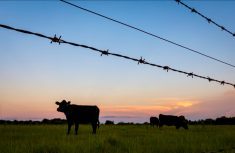Have a marketing plan in place and stick to it, FCC’s Gervais says
Without the ballast of U.S. government data to keep them grounded, crop and livestock markets are expected only to become even more volatile for as long as the U.S. government shutdown lingers.
Coping with that added volatility is therefore “a matter of making sure you have a marketing plan in place” and sticking to it, according to J.P. Gervais, chief economist with Farm Credit Canada (FCC), the federal ag lender.
Read Also

U.S. grains: Corn futures lower as farmers sell, soy choppy
Chicago corn futures ticked lower on Tuesday on selling pressure as soybeans chopped up and down, though expectations of a bumper U.S. harvest limited the upside in prices, analysts said.
U.S. government services — including regular collection and release of massive amounts of crop and livestock data from the U.S. Department of Agriculture and its agencies — have been halted under a partial shutdown that began last Tuesday (Oct. 1).
The shutdown comes in the wake of a budget impasse in which Republicans in the U.S. House of Representatives seek defunding and/or repeal for President Barack Obama’s Patient Protection and Affordable Care Act — the so-called “Obamacare” bill — while the Democrat-controlled Senate aims to keep the Act intact.
Many crop and livestock futures contracts are settled based on the price data now-furloughed USDA staff collect, process and release, Gervais said, so for those trading in ag commodities, the lack of data has had an immediate and significant impact.
A shutdown of just a few days may not have much of an effect, but a shutdown lasting beyond Friday (Oct. 11), when USDA’s latest report on world agricultural supply and demand estimates (WASDE) is due out, will leave traders and producers in the dark.
“The danger is that these markets are going to move up and down quite a bit (based on) any information that’s deemed at all reliable” and producers don’t need that level of volatility, Gervais said in an interview.
Generally, he said, other agencies such as the United Nations’ Food and Agriculture Organization, are seen as less efficient than USDA in their ability to collect data.
From a Canadian perspective, crops remain “very much a North American market,” Gervais said. Even though Canada is predicted to be on the verge of its biggest canola harvest ever, canola futures still largely take their cues from U.S. soybean markets.
And Canadian producers, who move over $15 million in crops and $6 million in livestock to the U.S. on a daily basis, have a “vested interest” in a smooth flow of trade, he said.
An effective marketing plan, he said, will involve marketing product at an acceptable percentage above one’s cost of production — and not overreacting as prices rise and fall.
Debt ceiling
From an economic perspective, however, the larger threat from the shutdown and impasse comes as the U.S. government nears its debt ceiling, which is expected next Thursday (Oct. 17), Gervais said.
It’s no secret that the U.S. has a “big debt problem,” spending substantially more than it’s able to raise in revenue, Gervais says.
Obama, like any president, is constitutionally required to get authorization from Congress — that is, the combined House of Representatives and the Senate — to borrow money beyond a certain limit.
Given the pace at which U.S. federal debt is increasing, Oct. 17 is the date by which U.S. borrowing is expected to exceed the ceiling Congress has previously set.
If the U.S. — whose debt is considered among the safest of investments — began to default on its debt repayments, interest rates would skyrocket, Gervais said.
The consequences of a default would be so massive, he said he doesn’t expect it to be an issue, and one way or another, a deal on the debt ceiling will be reached. “I don’t think we’re going to see an outcome as terrible as we would if the U.S. defaults… The stakes are too high.”
Export-minded producers and processors, however, shouldn’t expect the Canadian dollar to benefit from U.S. economic woes. If commodity prices fall as a result, a commodity-rich country such as Canada could expect its currency to fall as well.
In any case, he said, “if you do a lot of cross-border business, hopefully you already have a plan in place.”
Consumer demand
Asked whether a prolonged shutdown of the government — the United States’ largest employer — would have an effect on U.S. consumer demand for Canadian wares, Gervais didn’t expect much to happen if the shutdown lasts only a week or two.
Beyond that, he said, consumers won’t cut down on their food purchases, but will likely shop at different places — for example, going to a big-box discount store for meat rather than a high-end meat shop.
Certain USDA services — such as those managed by its Animal and Plant Health Inspection Service (APHIS), Food Safety and Inspection Service (FSIS) and Agricultural Marketing Service (AMS) are continuing during the shutdown, the Canadian Cattlemen’s Association said in a notice Monday.
Packers must keep COOL
The new U.S. country-of-origin labelling (COOL) regulation — which the CCA and other groups describes as more onerous than its predecessor for Canadian livestock and meat traffic — is now in the midst of its six-month “education period.”
Federal personnel aren’t available to enforce COOL rules either way, the CCA said Monday, but “the obligation (for U.S. packers, processors and retailers) to comply remains.”
The U.S. Court of Appeals — to which the CCA, Canadian Pork Council and assorted U.S. meat industry groups have now taken their request for an immediate injunction to block the changes to COOL, pending their main court case against COOL — is still operating for now, the CCA said Monday.
Affected federal courts “will remain open for 10 business days and then reassess (their) situation and provide further guidance,” the CCA said. “All proceedings and deadlines remain in effect as scheduled, unless otherwise advised.” –– AGCanada.com Network
















